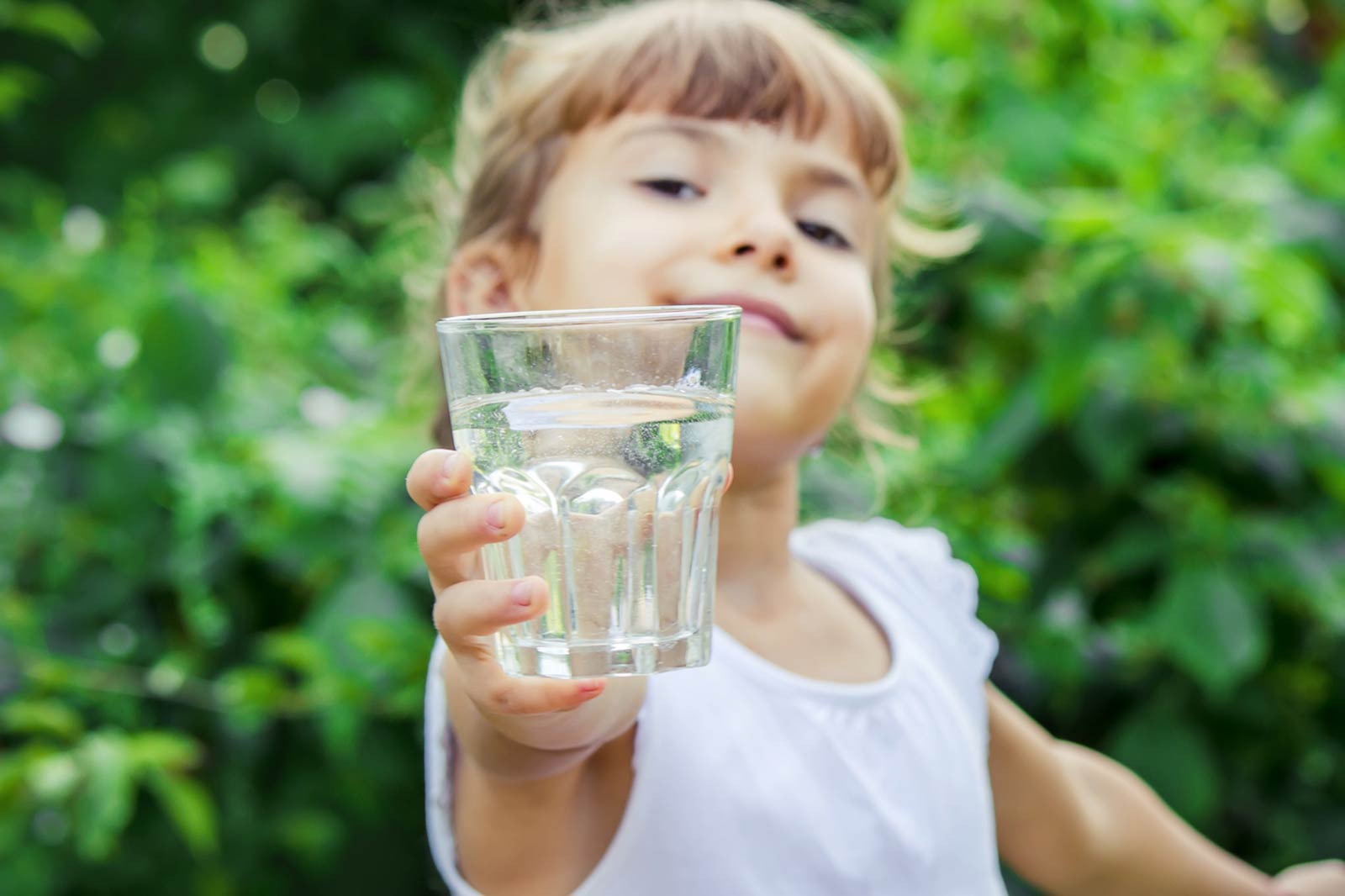The survival adage commonly referred to as the ‘Rule of Threes’ lists how long one can generally last without air (3 minutes), water (3 days), and food (3 weeks). Reminding ourselves to breathe is fortunately not something we have to worry about and judging from current statistics which state that one out of three Americans are obese, we are most assuredly getting enough food, albeit quantity over quality. Drinking enough water however, is where we are failing, as an estimated three-fourths of the population suffers from chronic dehydration.
Most people have heard that our bodies are somewhere between 60 – 65% water. We need to be properly hydrated to regulate body temperature, maintain healthy skin and joints, digest food, and help with cognitive skills because our big brains are quite squishy – about 75% water. It’s imperative that children stay hydrated because their young bodies are made up of even more water than their older counterparts. Due to their increased metabolism, they are prone to sweat more and often don’t recognize when they’re dehydrated because, well… they’re kids. And even mild dehydration in young adults has been linked to a dip in concentration and short-term memory, as well as an increase in feelings of anxiety and irritability.
Randomized control trials have shown that cognitive performance can be significantly improved in school aged children simply by making sure they drink a glass of water before they leave home – which was something approximately three-fourths of the youths studied didn’t do. Beverages such as milk and juice are not as hydrating, since the levels of sodium, sugars and amino acids can shrink cells and trigger the release of the hormone that signals dehydration.
When we move from the classrooms to the sports fields, drinking plenty of water is crucial for athletic performance, because muscles and tissues must be well hydrated to optimize both training and recovery. According to the U.S. Olympic and Paralympic Committee (USOPC), the importance of hydration on performance is five-fold: it enhances the body’s ability to regulate temperature and cool efficiently while avoiding unnecessary elevation in heart rate; it improves ability to recover quickly from training and competition; it minimizes muscle cramps; it enhances mental function, decision making, concentration, and motor control; and it supports effective immune defenses.
Conversely, without proper hydration, athletes at any age, level or ability can suffer from lack of concentration, early fatigue in training sessions, high perceived exertion during training, trouble tolerating heat, delayed recovery, muscle cramps, headaches, nausea, vomiting and an elevated heart rate above a normal response. These deleterious side effects of dehydration can take hours, or even days, to recover from.
Dr. Scott Rodeo, former Head Team Physician for the New York Giants Football and Olympic Head Team Physicians for USA Swimming concurs, saying “Hydration plays a major role in performance and muscle/joint injuries. If you’re not properly hydrated you run a higher risk of severe muscle cramps, strains and sprains.” Loosely translated, this means weekend warriors who hop off the couch and head straight to the tennis or basketball court without being properly hydrated are asking for a visit to the orthopedist surgeon’s office on Monday.
Our nutrition expert at The Noble Path Foundation, Melissa Mathes MPH, RD, also holds a Board Certification as a Specialist in Sports Dietetics (CSSD), which is the premier professional sports nutrition credential in the United States. CSSDs are registered dietitians who provide safe, effective, evidence-based nutrition services for health, fitness, and athletic performance. Her advice for proper hydration before, during and after athletic activity is as follows:
PRIOR to exercise: Consume 16-20 oz. of fluid approximately 3-4 hours before activity. Consume another 8-12 oz. 10-20 minutes before exercise.
DURING exercise: Drink 3-8 oz of water every 15-20 minutes. When exercising for more than one hour, the drink you choose should be a sports drink that contains both carbohydrates and electrolytes.
POST exercise: Drink 20-24 oz. of water or recovery drink for every 1 pound of weight lost. If no weight was lost, you should still consume at least 24 oz. of fluid the first hour after your workout. Ice your drink so it is absorbed more quickly and helps cool off your core temperature.
It’s important to note that Mathes also cautions against consuming more than 1 quart of water per hour of exercise due to the real danger of water intoxication – which is when the body contains too much water and dilutes the electrolytes. “This condition is called hyponatremia and is a serious situation. The symptoms include behavioral changes, confusion, drowsiness, nausea/vomiting, fluid retention, muscle cramps, paralysis and risk of death.” She emphasizes, “If you notice any of these signs, go to your nearest ER or urgent care and get treated immediately.”
When describing how important water is for our overall well-being, Mathes likes to use the analogy of hydration being the vehicle that provides transportation for nutrients and oxygen to get to the tissues, as well as providing a ride back out for toxins and metabolic waste via sweat, urine and stool. In other words, being dehydrated is like having a traffic jam in your body, if not an all out sigalert.
Since we naturally lose water through normal bodily functions such as sweating, going to the bathroom or simply breathing, in order to maintain a healthy balance of fluids, Mathes recommends 30-35 ml water/kg daily for the average healthy adult. Similar suggestions from the National Academy of Medicine are 11 cups (88 oz) a day for women and 16 cups (128 oz) per day for men. The National Academy of Pediatrics recommends that an active child drinks 6-8 cups of water per day. These amounts can vary due to a variety of factors, including weather temperature, exercise and/or illness, but the quickest and easiest way to tell whether you’re getting enough fluids is to simply check the color of your urine when you pee. A dark yellow to amber color indicates dehydration, while a very pale yellow to practically clear means you’re getting enough fluids.
In summary, as we’ve moved from the classroom to the sports field and now to the bathroom, we’ve essentially been given a magic elixir which can make us happier, healthier and perhaps even a little bit smarter. It can dramatically improve our endurance and athletic performance, help keep us free from injuries and aid in our recovery. Advertise that on the internet and you could probably charge a pretty penny. Especially since you can get it delivered to you faster than buying it on Amazon Prime, by simply walking over to your sink and turning on the faucet.
Clean, fresh water (which we often take for granted) should always be our preferred method of hydration, as unnecessary liquid calories in the form of sugary soft drinks and beverages continue to fuel epidemics of obesity and chronic disease. The best way to beat dehydration is to drink before you get thirsty, keep drinking until what you flush down the toilet looks like pale lemonade and always carry a refillable, non-toxic water bottle wherever you go. Your body, your mind, and the environment, will thank you!
Cindi is President and Founder of The Noble Path Foundation, a 501(c)(3) located in San Clemente, CA, dedicated to helping the youth of our communities reach their highest potential via healthy nutrition and lifestyle choices, safe and fun social activities, and motivational mentoring. For sources and links to the statistics mentioned in this article, please visit our website and search for the article under our blog at www.thenoblepathfoundation.org.
SOURCES:
Hydration status moderates the effects of drinking water on children’s cognitive performance: https://pubmed.ncbi.nlm.nih.gov/26271221/
Drinking plain water is associated with decreased risk of depression and anxiety in adults: Results from a large cross-sectional study:
Does a Drink of Water Make Children Smarter?: https://nutritionfacts.org/video/does-a-drink-of-water-make-children-smarter/
Dehydration may affect cognitive performances as water accounts for 75% of brain mass. https://www.ncbi.nlm.nih.gov/pmc/articles/PMC6068860/
Mild Dehydration Triggers Moodiness & Fatigue in Women:https://www.livescience.com/36106-mild-dehydration-triggers-moodiness-fatigue-women.html
Effects of Changes in Water Intake on Mood of High and Low Drinkers:
Dehydration and Anxiety: How to Keep Calm and Hydrate On: https://www.healthline.com/health/anxiety/dehydration-and-anxiety
Doctors Say Most Americans Are Dehydrated: https://chicago.suntimes.com/2018/11/8/18455701/doctors-say-most-americans-are-dehydrated


